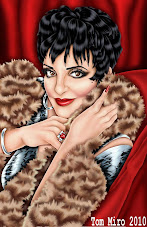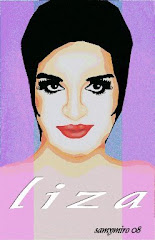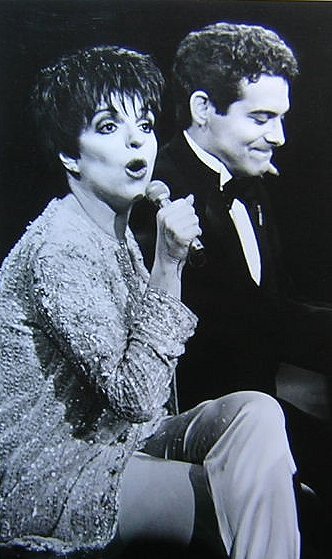
By Pete Clark, Evening Standard 27.05.08
As soon as I got through the doors, it was obvious that this was going to be an evening to die for.
There is a sense of excitement at certain gigs, and then there is the faintly hysterical cloud of mingled hormones that signifies the arrival of Liza Minnelli.
Although no one says as much, there seems to be a general consensus that it is a miracle that this woman is still with us.
Most of the lower part of her body has been rebuilt, and her brain and heart have been put through the mincer by a series of catastrophic episodes, not all of which have been beyond her control.
When she takes the stage, the audience are swept to their feet and narrowly avoid being involved in a stage-diving swoon.
She wears items of clothing that sparkle like they did in the old days. “You look terrific,” she tells the adoring throng, knowing, in the nicest possible way, that they are just a reflection of herself. Whatever costume she is wearing, a shoulder will sooner or later be revealed and thereupon will be displayed a glittering bra strap. This, I think, is her signature.
There are some songs, of course, but they are mostly fitted in between anecdotes, the kind of anecdotes that you might find yourself spilling out to a therapist. There was a story about a powder puff soaked in tears that made me wish I had a therapist to call my own.
She says of her pianist: “When he plays, I can hear my heart beat.” It would take a stony heart not to recognise that the person on stage is a very needy individual.
She has been brought up on the sound of applause and can count the sincerity of every single handclap. That is why she is such a great performer: when you turn up at a concert such as this, you had better wear your heart on your sleeve.
Her voice is still terrific, although the breathlessness has gone beyond stage effect and become a worry. A couple of tunes from Cabaret get a run out, but her heart is obviously in the material from the second half of the show, which is a tribute to mentor Kay Thompson and is performed with four song-and-dance men impersonating the Williams Brothers of the 1940s.
By this time, Liza is wearing very little, revealing legs that may owe something to medical science but have been fiercely reclaimed.
“Remember when I used to get down on one knee?” she teases, “Well forget it.”
The lady can still self-deprecate and we should all get down on one knee and thank heaven for it. What a glorious show-off.
There is a sense of excitement at certain gigs, and then there is the faintly hysterical cloud of mingled hormones that signifies the arrival of Liza Minnelli.
Although no one says as much, there seems to be a general consensus that it is a miracle that this woman is still with us.
Most of the lower part of her body has been rebuilt, and her brain and heart have been put through the mincer by a series of catastrophic episodes, not all of which have been beyond her control.
When she takes the stage, the audience are swept to their feet and narrowly avoid being involved in a stage-diving swoon.
She wears items of clothing that sparkle like they did in the old days. “You look terrific,” she tells the adoring throng, knowing, in the nicest possible way, that they are just a reflection of herself. Whatever costume she is wearing, a shoulder will sooner or later be revealed and thereupon will be displayed a glittering bra strap. This, I think, is her signature.
There are some songs, of course, but they are mostly fitted in between anecdotes, the kind of anecdotes that you might find yourself spilling out to a therapist. There was a story about a powder puff soaked in tears that made me wish I had a therapist to call my own.
She says of her pianist: “When he plays, I can hear my heart beat.” It would take a stony heart not to recognise that the person on stage is a very needy individual.
She has been brought up on the sound of applause and can count the sincerity of every single handclap. That is why she is such a great performer: when you turn up at a concert such as this, you had better wear your heart on your sleeve.
Her voice is still terrific, although the breathlessness has gone beyond stage effect and become a worry. A couple of tunes from Cabaret get a run out, but her heart is obviously in the material from the second half of the show, which is a tribute to mentor Kay Thompson and is performed with four song-and-dance men impersonating the Williams Brothers of the 1940s.
By this time, Liza is wearing very little, revealing legs that may owe something to medical science but have been fiercely reclaimed.
“Remember when I used to get down on one knee?” she teases, “Well forget it.”
The lady can still self-deprecate and we should all get down on one knee and thank heaven for it. What a glorious show-off.













































































































No comments:
Post a Comment